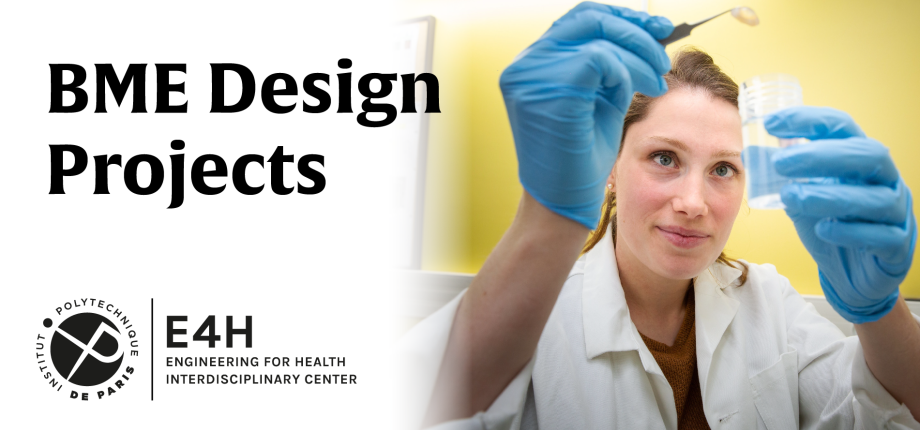BME Design Projects

As part of the Biomedical Engineering (BME) master’s program, the Engineering for Health Center (E4H) of Institut Polytechnique de Paris is soliciting ideas for BME Design Projects. Over two academic semesters, BME student groups work on an open-ended BME design problem, guided by one or more BME faculty, industrial sponsors, and/or clinicians. The character of the projects is highly variable and may include theoretical studies, computational simulations, device design, and/or prototype development.
The BME Design Projects are intended to provide students with the opportunity to apply their training towards the development of innovative solutions that meet real medical needs. We encourage faculty, industrial partners and clinicians to submit project ideas to this program.
To work on the Design Projects, BME students have access to a broad range of campus experimental and computational resources including an extensive prototyping facility.
Application Submission procedure
The application, written in English, consists of the following:
- A cover page containing the project title, the project objective (brief description of the desired outcome), and the name and affiliation of the applicant
- Project description (maximum 2 pages)
- Materials, services, and resources available to the students for the project
- Relevant literature sources including journal articles and/or websites
Application Timeline
Application should be submitted electronically as a single PDF file by October 1st, 2025.
Selection Criteria
Before the beginning of the semester, the BME faculty will review the submitted project ideas. The proposal should contain a clear feasible desired outcome aimed at the design and development of a medical or biological device, medical simulation model, or a physical tool to assist in research and/or medical practice.
The approved projects are made available to the students at the beginning of the academic year. Once a match between the proposed project and a student team is established, the team will immediately contact the industrial/medical partner to initiate the collaboration. There is no guarantee that all proposed projects will be selected. If a particular project is not selected, the industrial/medical partner should feel free to resubmit it for the following academic year.
Industrial/medical partner obligations
The selected partners are expected to provide the following to the student team:
- Time and attention, either in person or electronically. Partners should meet with their student teams frequently (at least 4 hours per month)
- Guidance and compliance regarding all of the appropriate hospital or industry safety protocols if applicable
- Financial support for necessary materials and supplies if the cost exceeds 500 €
- Other resources including information, access to existing equipment, technician time, etc.
For further information, please contact Joni Frederick : frederick@ladhyx.polytechnique.fr
> Submit your application here
Deadline: Octobre 1st, 2025
Projects selected in previous years
- Development of a microfluidic chip activator and results interpreter for a new tuberculosis screening tool
- Project leader : Startup EpiLab
- Supervision : Manon Giraud (Epilab)
- Mandibular magnetic distractor: A new personalized positioning device for mandibular magnetic distractor in maxillo-facial surgery
- Project leader : ENSTA Paris, AP-HP, Université Paris Cité
- Supervision : J. Boisson (ENSTA Paris), N. Kadlub (AP-HP, Université Paris-Cité)
- Predicting the concentration of anti-infective molecules and their toxicity
- Project leader : Groupe hospitalier Paris Saint-Joseph
- Supervision : Johann Gutton (GHPSJ)
- Intra-osseous injection: improving the realism of an existing simulator for intraosseous infusion in children/infants on the tibia 1/3 internal face
- Project leader : Université Paris Cité
- Supervision : Vincent Lemarteleur, Aurélie Benoit (Université Paris Cité)
- Deep learning application of ear dysplasia in assessing Goldenhar Syndrome
- Project leader : Hôpital Necker (AP-HP)
- Supervision : Pr. Roman Hossein Khonsari (AP-HP, Institut Imagine, Université Paris Cité)
Affordable patient support for motor recovery after stroke
- Project leaders : Autonomous BME student project (Andrea Esquival et Léon Gebhard)
Mycelium Culture Optimisation System for Mushtic
- Project leader : Startup Mushtic
- Supervision : Charbel Sayah (CEO Mushtic)
Learning to Predict the Response to Antidepressant Drugs
- Project lead: ENSTA
- Supervision : Andrea Simonetto, Department of Applied Mathematics (UMA), Optimization and control team (OC)
Magnetic Hip Joint Models
- Project lead: PGU MedTech
- Supervision : Matthias Pideri (CEO PGU MedTech)













